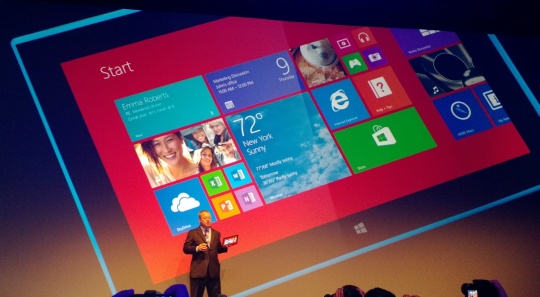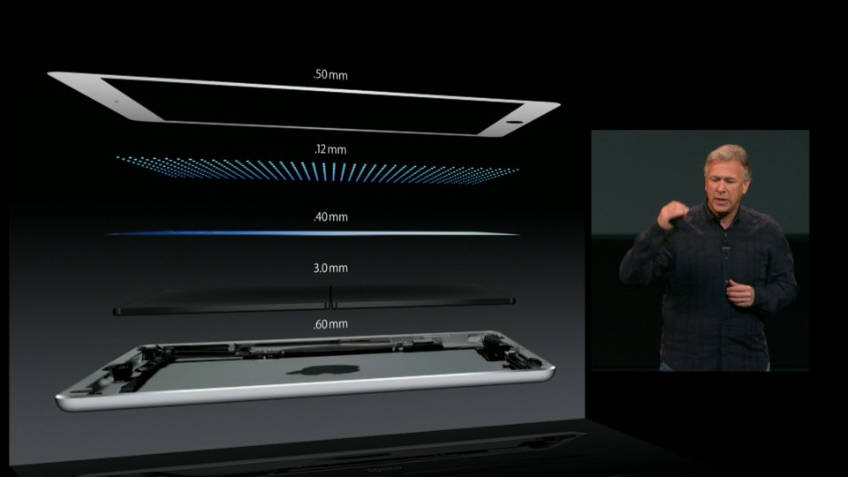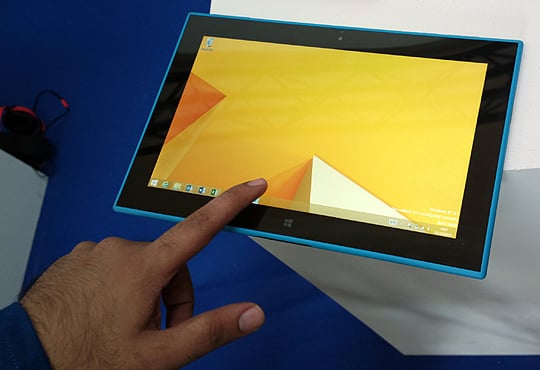Original URL: https://www.theregister.com/2013/10/24/microsoft_apple_lose_to_android/
Surface 2 and iPad Air: Prepare to meet YOUR DOOM under a 'Landfill Android' AVALANCHE
Viral beats the luxury touch at Christmas
Posted in Personal Tech, 24th October 2013 09:32 GMT
Analysis Within just 24 hours, both Microsoft and Apple have refreshed their tablet lineups for Christmas.
Microsoft tried to steal a march on Apple by launching Surface Pro 2 and the rebranded Surface RT, now called Surface 2.

Dropping the RT from the outside, not the inside
Apple dutifully followed suit on Tuesday night with two new tabs of its own – the iPad Air and a new iPad Mini with Retina display.
The stories that both companies are spinning to sell the new tabs are a Holy Trinity for hardware heads: they're both thinner, lighter and faster than before.
Microsoft and Apple are locked in a battle for market share and money, to convince the public their tablet offers the best value. It’s a battle that’s being fought, not just on technical specs, however; it's being fought over software and services, too.

Ah well. Only one present this year...
The stakes are higher this Christmas season than ever before: it’s the first quarter when analyst IDC reckons tablets will outsell PCs. It’s the start of a long-term trend that IDC reckons will start to become an established fact by the end of 2015.
It’s like the Scramble for Africa, and the tablet-maker that runs fastest in the end will have the greatest territory under their control. That will mean more customers to upsell in future, along with more customers feeding data into their clouds and consuming apps from their App Stores.
There can be only one winner and that winner will be Android (and by extension, Google) – yes, Android. Apple will come a respectable second but it's Microsoft, the Johnny Come Lately to tablets, who will struggle this season. Microsoft can only hope it won't be a re-run of the Hindenburg-style crash that hit its Surface sales in Christmas 2012.
Further, it’s looking worryingly like at least one horse in Microsoft's stable – the once-golden-now-unwanted Surface RT or Surface 2 – is the leading candidate to get chopped. That is, unless Microsoft decides to keep pouring millions of dollars into the device to prop it up.
But, let's start with the specs in the Apple versus Microsoft chapter of this tablet battle.
iPad Air vs Surface Pro 2
Apple’s iPad Air is 7.5mm thick, weighs 478g, and packs the ARM-based dual-core Cortex-based A7 chip from the iPhone 5S. Microsoft’s Surface Pro 2 runs Intel’s multi-core i5 Haswell chip is 1.3cm thick and weighs 2lb. Surface 2 runs the quad-core Cortex-based NVIDIA Tegra 4 chip, is 676g and 8.89mm thick.
Performance is the single biggest change in Surface Pro and Surface, Windows senior product manager Robert Epstein told The Reg on Tuesday.
He claimed Pro now offers up to 10 hours battery life and the ability to multi-task, switching between Outlook, OneNote, PowerPoint and Excel.
Epstein reckoned Microsoft’s learned its lesson since the great disaster of the Christmas 2012 shopping quarter, when Microsoft sold just 722,000 Surface RTs with 1.6 million Windows-based tabs right after launch giving 3.4 per cent market share.
“We’ve made big strides on the device,” Epstein said. “Surface 2 has four times the performance of the first Surface, the screen his high quality, the version of Windows is 8.1 and we listened to consumer feedback to make that a better experience, and the number of apps is growing through the [Microsoft] store.”
Asked why things went wrong, Epstein said: “There’s no silver bullet answer, devices and services is an exciting adventure for us, and you have to get a lot of parts right.”
Twelve months on, the metric for success is simple - and raw. Success equals greater market share.
“We are out to get as much market share as we can grab,” Epstein said. “We are looking for the right positioning on our products.”
Microsoft, though, has already lost to Apple on the specs: its tablets are heavier with the Pro qualifying as something for a category of user that laptop makers in the 1990s called “road warriors.” Epstein reckons Pro is for somebody who wants “it all” - to crunch data or edit video on the road and then quick back and watch a film. He reckoned it's for somebody in the Apple world who'd have bought a MacBook Pro.
It might be lighter than a MacBook pro but lugging a Surface Pro across London, I can vouch for the fact it's heavier than any slab machine I've handled. With the iPad Air here, the weight of the Surface Pro underscores how lightness is a major factor for considering in a tablet.
But while it's heavier, the Pro is actually the strongest asset in Microsoft’s tablet stable.
Meet Surface 2, Lumia 2420, Surface 2420, er....
That’s because the Pro runs existing Windows apps thanks to the fact it uses that Haswell chip from Intel, unlike Surface 2 that uses ARM.
Further, things are about to get awfully confusing for Surface 2. That's because Nokia this week launched the Lumia 2520 also on ARM and also packing the same version of Windows 8.1 for that chipset – Windows RT. Nokia is the only company outside Microsoft to offer a Windows RT tablet.

Which should users pick? It's not clear. Compare the specs from Nokia and Microsoft here from All-About-Microsoft's Mary-Jo Foley and you'll see there's not an awful lot to chose between them. Asked to justify Surface 2 versus the Lumia 2520. Epstein told us simply it had: “A great user experience, all day battery life, great performance.”
Life for Surface 2 the Lumia 2520 will become difficult once Microsoft's purchase of Nokia is closed as Microsoft is unlikely to sell similar products. As one Twerp noted on the Surface 2 and Lumia 2520 news:
New today: Surface tablets with Windows 8.1. Not to be confused with today's Windows 8.1 tablet from Nokia. Which soon will be Microsoft.
— Shira Ovide (@ShiraOvide) October 22, 2013
That’s where software and services are being used to crowbar some difference between the Microsoft and the Apple camp.
Surface 2, like Surface RT, comes with a tailored version of Office 2013 Microsoft tells us is for teachers and people running their home lives though Excel or Word when they’ve done a bit of browsing.
Now, however, you also get 200Gb Skydrive storage for two years and a year’s free Skype calling. Epstein called his evidence of the fact Microsoft is working in a more coordinated way on Surface than a year back.
The problem is, Apple is also packing in the software: the iPad Air will come with free versions Apple’s latest iWork and iLife personal productivity and media apps.
It's therefore looking like price will be the thing that separates winners from losers in this quarter's land grab, and it’s on this basis that Android will set down roots to become the mass-market winner.
Are you sure it's the lack of products, Apple?
Apple’s iPad sales have been falling: they were down in the June quarter by between three and 14 per cent - depending on how you calculate your numbers - a fact that Apple blamed on a lack of new products to tempt shoppers.
A year earlier, sales were kicked up by the iPad 3 with Retina display. In the run up to Christmas, Apple now has the iPad Air and new Mini – so we can expect growth but you should also expect a drop after the initial bubble. Worse, Apple shows no appetite for cutting prices to continue its momentum.
The iPad's market share, meanwhile, has fallen to 43.1 per cent in the fourth quarter of 2012 from 51.7 per cent in 2011, according to analyst IDC.
Over at Microsoft, it's not looking like the company can stimulate - or even benefit - from a dash-for-Africa-style land grab.
Consumer interest is lacking with shoppers staying away from the Microsoft shops in droves. Early reviews of the new hardware features are lack luster. For all that, Microsoft doesn’t have enough Surfaces in stock to assault the market, with just 2,000 units for the UK in a market where resellers are used to handling tens of thousands each quarter.
Instead, Epstein said Microsoft would overcome lack of interest by getting its message out. He reckoned Microsoft is spending tens of millions of dollars on advertising, marketing and partner training for Surface 2 and Windows 8.1. It is a “significant” marketing investment, he said.
Like Apple, Microsoft is not compromising on price: Surface Pro 2 starts at £719 and goes up to £1,439 and Surface 2 runs between £359 and 3439. Those are very Appley prices: the WiFi version of the iPad Air is priced between £329 and £739 while Epstein expects the sweet spot for Pro will be the 128Gb version priced £799 versus £639 for the 128Gb WiFi-only iPad Air.
We don't want the cheapskates - but they want you
Neither does Epstein believe somebody in the market for a cheap Android tablet will be the kind of customer who buys a Surface. Yet, he also argues Surface should be your one mobile device - for browsing, gaming working and reading. The idea is you buy one Surface rather than lots of tablets or readers.
But, while Microsoft tries to be Apple on price and "quality experience" its the Android units that are winning the scramble for Africa.
In the latest departure, UK retailers Tesco and Argos have released Android tablets: the 16GB Tesco Hudl starts at £119 and Argos' 8GB Android Bush starts at £99. They lighter than the tablets from Microsoft and Apple and confirm to the new 7-inch screen size Gartner is is now canibalising tablets. As for services, they are hooked into Google's App Store, Docs and Gmail, with devices getting served up online ads thanks to Google.
Yes, the new class of tabs coming from the Tescos and Argoses of this world are weaker on product specs than Apple's iPad or Microsoft's Surface. And, yes, there’s no guarantee they will last longer than a turkey drumstick on Boxing Day either in terms of product durability or long-term consumer interest.
The problem is more money and market share that could have gone Microsoft’s way is going to Android. The fact it's no longer the Samsungs of this world but high-street retailers offering Android devices should worry Microsoft and Apple, because it proves just how viral Android has become.
More Android devices means more power to Google, too. It means more end points sending more individuals' data into the Google cloud and means more ads for Google to serve to mobile users through new types of devices.
If tablets go like smartphones, then that should worry anybody who can’t compete on piece and claims they're selling a “quality experience” instead. ®